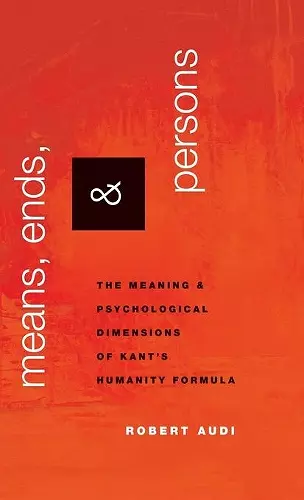Means, Ends, and Persons
The Meaning and Psychological Dimensions of Kant's Humanity Formula
Format:Hardback
Publisher:Oxford University Press Inc
Published:12th Nov '15
Currently unavailable, and unfortunately no date known when it will be back
This hardback is available in another edition too:
- Paperback£29.49(9780190913748)

No one wants to be treated merely as a means-"used," in a sense. But just what is this repugnant treatment? Audi's point of departure is Kant's famous principle that we must treat persons as ends in themselves and never merely as means. Treatment of these kinds is conduct, a complex three-dimensional notion whose central elements are action, its motivation, and the manner of its performance. He shows how the notions of treating persons as ends and, by contrast, merely as means, can be anchored outside Kant and clarified in ways that enhance their usefulness both in ethical theory and in practical ethics, where they have much intuitive force. Audi constructs an account of treatment of persons-of what it is, how it differs from mere interpersonal action, and what ethical standards govern it. In accounting for such treatment, the book develops a wider conception of ethics than is commonly implicit in utilitarian, deontological, or virtue theories. These results contribute to ethical theory, but in its discussion of diverse narrative examples of moral and immoral conduct, the book also contributes to normative ethics. Audi's theory of conduct takes account of motivational elements that are not traits of character and of behavioral elements that are not manifestations of virtue or vice. Here it goes beyond the leading virtue approaches. The theory also advances rule ethics by framing wider conception of moral behavior-roughly, of acting morally. The results advance both normative ethics and ethical theory. For moral philosophy, the book frames conceptions, articulates distinctions, and formulates principles; and for practical ethics, it provides a multitude of cases that illustrate both the scope of moral responsibility and the normative standards for living up to it.
There are many things to appreciate about this book. The chapters are rich with detailed examples which provide a valuable resource for teaching and for further study. Also, Audi has again demonstrated his mastery of the difficult feat of writing a serious philosophical text that has significant depth, while at the same time giving us a text that is jargon-free enough to be of use to the non-specialist. Furthermore, despite the theoretical focus of the book, practical concerns are never far from view. In fact, the final chapter focuses on the extent to which we have control over our treatment of one another and ends with a discussion that reveals his deep concern for acting morally toward one another. It's a lovely way to end a book about what it means to treat people as ends in themselves. * Sharon Mason, Metapsychology Online Reviews *
Audi pursues his discussion of the Formula of Humanity with unstinting care and philosophical ingenuity. Through well-chosen examples and patient exposition he develops a moral psychology that throws light on what it takes to live up to the principle ... the effort to expound the Formula of Humanity in a way that exemplifies its relevance to the greater world of ethical theory is a success. * Kenneth Walden, Notre Dame Philosophical Reviews Online *
ISBN: 9780190251550
Dimensions: 142mm x 213mm x 18mm
Weight: 318g
190 pages